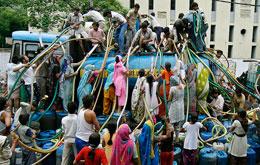Caste protest triggers water crisis

Protests in India over caste quotas for jobs and education have been called off, but Delhi was still struggling with water shortages after demonstrators damaged infrastructure, officials said Tuesday.
At least 19 people have been killed and more than 200 injured in the agitation by the Jats, a farming caste in north India, who were demanding quotas in government jobs and higher education institutions for their community.
They called off the protests after the Haryana state government said it would introduce the quotas in state-level legislation, state Home Secretary PK Das said.
"While most Jat groups ended the agitation on Monday, a few groups were defiant," Das told dpa from the state capital Chandigarh. "But they also agreed to end the protests after negotiations with the government late Monday night."
Protestors had also lifted blockades on a key highway to Delhi and other roads in the state. No violence was reported since Monday night.
In Delhi, Water Minister Kapil Mishra said partial water supply resumed from Haryana's Munak canal, that provides water to the northern, central and western areas of the city with a population of 17 million.
Protestors damaged equipment at the pumping station, causing shortages in Delhi, but the army managed to secure the facility on Monday.
"Till the time [the canal] is totally repaired, supply will be limited," Mishra said in post on Twitter. "The crisis is not yet over. Use water diligently."
The shortages affected as many as 10 million residents over the weekend as the canal accounts for about 60 per cent of Delhi's water supply.
Water board spokeswoman Sanjam Cheema defended the efforts by authorities to ensure continued supply.
"Many areas did not get piped water but it would be inaccurate to say 10 million were left without any water, they did get water through hundreds of tankers," Cheema said.
Households also drew groundwater with pumps or bought bottled water.
"Its been an ordeal to line up for hours at groundwater pumps or tankers. We are tired of fetching water from different areas," resident Saurav Dendona said.
The crisis highlights the precarious water supplies in the Indian capital where water for the growing population is in short supply even in normal times.
The week-long agitation in Haryana saw protestors set fire to homes and shops, and block highways, roads and rail links across northern India.
The unrest could cost the region's economy 5 billion dollars, according to the PHD Chamber of Commerce and Industry, a trade association representing the northern states in the country.
India has an affirmative action policy which includes quotas for the lowest castes, members of which have benefited under the system for centuries.
Over the years, the government has expanded the quotas to include other communities that are economically or socially disadvantaged.
Jats are largely a well-to-do land-owning community, but say the quota policy is unfair and demand that the benefits be extended to them as well.









